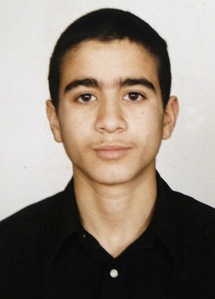
His sister Zaynab and brother Abdullah have been investigated for alleged ties to Al-Qaeda, and another brother, Abdurahman, has admitted on Canadian television that the family knew Osama bin Laden and that he and some of his siblings were trained by Al-Qaeda in Afghanistan.
"I was raised to become a suicide bomber. I was raised to become a bad person," Abdurahman said.
Yet despite his family history, "Omar identifies himself strongly with Canada," his former US military lawyer Lieutenant-Commander Bill Kuebler said last year.
Omar Khadr was taken to Pakistan with his parents in 1990, when he was a child, to help with reconstruction along the Pakistan-Afghan border following the withdrawal of Russian troops, according to an online family biography.
He returned to Canada in 1995 after his father was briefly arrested in Pakistan for his alleged role in an attempted bombing of the Egyptian embassy in Islamabad, but returned to Pakistan the following year.
At one time, around 1996, the Khadr family lived in a compound in Jalalabad, Afghanistan, where Abdurahman says he met bin Laden for the first time.
After the September 11, 2001 attacks in the United States, Omar found himself in Afghanistan.
A year later, he was captured by US soldiers in Khost, in the east of the country.
The US government alleges Khadr was the lone survivor of a four-hour US bombardment of an Al-Qaeda compound in Afghanistan in 2002, who rose from the rubble and killed a US sergeant with a grenade.
Kuebler described him as a "frightened, wounded, 15-year-old boy, a boy like other children wrongfully involved in armed conflict who had no business being there, who sat slumped against a bush while a battle raged around him."
He is a "good kid" and "salvageable," according to his captors, cited in Canadian government files published last year.
Khadr was shot at least twice in the back by US soldiers and was about to be executed when another soldier intervened, Kuebler told a Canadian parliamentary committee in 2008.
In a heavily redacted affidavit, Omar Khadr says he was treated brutally after his capture, when he was taken, severely wounded, to a military camp in Bagram, Afghanistan, and later to Guantanamo.
A video posted online in July 2008 shows him sobbing and begging for help as he is interrogated by Canadian agents at Guantanamo.
In one excerpt, Khadr tugs at his hair, and pulls his orange prisoner suit over his head to show his interrogator his battle scars.
The video shows no abuse, though files from the Foreign Intelligence Division of Canada's Foreign Affairs department say officials at Guantanamo sleep deprived Khadr to soften him up for questioning by Canadian officials.
In April, Canada's Federal Court ordered the government to ask Washington to repatriate him. The decision was upheld on appeal, but may yet go to the Supreme Court.
-------------------------------------------------------------------------------------------------------------------------
"I was raised to become a suicide bomber. I was raised to become a bad person," Abdurahman said.
Yet despite his family history, "Omar identifies himself strongly with Canada," his former US military lawyer Lieutenant-Commander Bill Kuebler said last year.
Omar Khadr was taken to Pakistan with his parents in 1990, when he was a child, to help with reconstruction along the Pakistan-Afghan border following the withdrawal of Russian troops, according to an online family biography.
He returned to Canada in 1995 after his father was briefly arrested in Pakistan for his alleged role in an attempted bombing of the Egyptian embassy in Islamabad, but returned to Pakistan the following year.
At one time, around 1996, the Khadr family lived in a compound in Jalalabad, Afghanistan, where Abdurahman says he met bin Laden for the first time.
After the September 11, 2001 attacks in the United States, Omar found himself in Afghanistan.
A year later, he was captured by US soldiers in Khost, in the east of the country.
The US government alleges Khadr was the lone survivor of a four-hour US bombardment of an Al-Qaeda compound in Afghanistan in 2002, who rose from the rubble and killed a US sergeant with a grenade.
Kuebler described him as a "frightened, wounded, 15-year-old boy, a boy like other children wrongfully involved in armed conflict who had no business being there, who sat slumped against a bush while a battle raged around him."
He is a "good kid" and "salvageable," according to his captors, cited in Canadian government files published last year.
Khadr was shot at least twice in the back by US soldiers and was about to be executed when another soldier intervened, Kuebler told a Canadian parliamentary committee in 2008.
In a heavily redacted affidavit, Omar Khadr says he was treated brutally after his capture, when he was taken, severely wounded, to a military camp in Bagram, Afghanistan, and later to Guantanamo.
A video posted online in July 2008 shows him sobbing and begging for help as he is interrogated by Canadian agents at Guantanamo.
In one excerpt, Khadr tugs at his hair, and pulls his orange prisoner suit over his head to show his interrogator his battle scars.
The video shows no abuse, though files from the Foreign Intelligence Division of Canada's Foreign Affairs department say officials at Guantanamo sleep deprived Khadr to soften him up for questioning by Canadian officials.
In April, Canada's Federal Court ordered the government to ask Washington to repatriate him. The decision was upheld on appeal, but may yet go to the Supreme Court.
-------------------------------------------------------------------------------------------------------------------------









 Home
Home Politics
Politics









